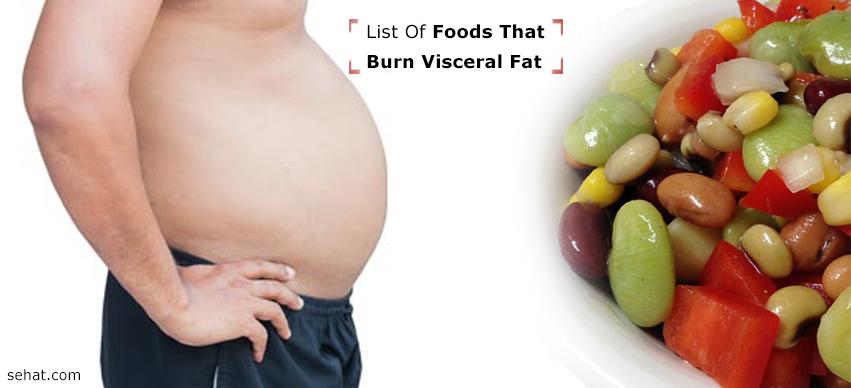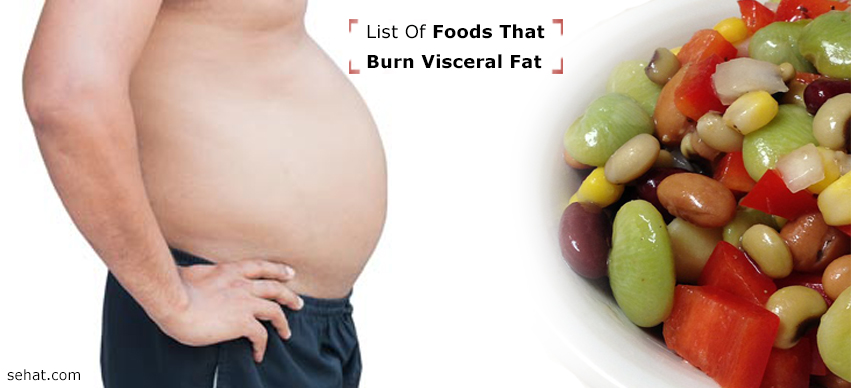
In the last few years, obesity has become a global problem, carrying with itself a wide number of illnesses. With a steady rise in various treatment options for weight loss as well as fat loss, people are becoming increasingly aware of the health hazards of being overweight or obese.
Achieving a healthy weight has indeed become the need of the hour for every individual, yet it is also one of the most difficult tasks, as suggested by high prevalence rates of obesity worldwide.
Visceral fat is also known as belly fat; that is, fats present inside the abdominal cavity around the viscera (organs) like the intestines, liver, spleen, and stomach. The high amount of visceral fat has been linked to high risk of developing serious illnesses such as;
It is also known to increase inflammatory markers in circulation in response to excess fats which in return increases the risk of developing several chronic diseases and even cancer.
Foods that burn visceral fat can be consumed both by people who exercise regularly as a means to accelerate the process of fat loss as well as by those who are unable to spare time for regular exercise and rely only on diet to lose fats and maintain their weight. In this article, you can know the list of foods that burn visceral fat.
List Of Foods That Burn Visceral Fat
The following are some of the lists of foods that burn visceral fat and can even promote weight loss;1. Foods Rich In Fiber
- consumption of food rich in fiber in the form of natural products or health supplements is known to lower the risk of cardiovascular diseases and also helps in effective weight management.
- Dietary fiber is the edible part of plants or their extracts that are resistant to digestion and absorption
- Several randomized clinical studies have demonstrated that greater dietary fiber intake is associated with loss of visceral fat and also lower risk for cardiovascular illnesses as well as coronary artery diseases.
- Fiber not only helps to suppress appetite but also keeps gut bacteria in a healthy state.
- Fresh fruits and vegetables are excellent sources of dietary fiber.
2. Low Carbohydrate Foods
- Low carbohydrate or ketogenic diet is known to reduce visceral fats.
- Several research studies have been conducted to prove its effects. A study was done to observe "Beneficial effects of low carbohydrate in low-calorie diets on visceral fat reduction in type 2 diabetics with obesity".
- The study proved that there was a significant reduction in body weight and serum glucose levels of the patients included in the study.
3. High Protein Foods
- Protein is as important as fiber for visceral fat loss.
- This theory is supported by several studies that show that people who consume lean proteins have lesser visceral fat as compared to people who do not consume enough proteins.
- A study conducted recently concluded that consuming a suitable amount of proteins throughout the day led to a reduction in total body fat and abdominal fat.
- Proteins are readily available through non-vegetarian sources such as lean chicken, fish, and eggs. Other vegetarian sources of proteins include nuts, seeds, lentils, sprouts, and fresh green leafy vegetables.
4. Probiotics
- If you are seeing foods that burn belly fat fast, consider including pro-biotic foods such as curd, buttermilk in the diet. Probiotics are also available in the form of health supplements.
- Pro-biotics maintain gut health by maintaining intestinal healthy bacteria. There are research studies that prove that consuming probiotics regularly are linked to a reduction in the absorption of fats by the gut. This may also cause an increase in the excretion of fats through feces.
Other Measures To Burn Visceral Fat
- Along with diet, curbing a sedentary lifestyle by the inculcation of regular physical activity in the form of brisk walking, running, yoga, swimming, joining a gym, or engaging in outdoor sports can enhance visceral fat loss.
- Encourage a healthy eating environment within the family such as timing, consumption of nutritious foods like fruits and salads, and limit the purchase of high-calorie foods.
- Focus on sleep habits and patterns. Improper sleep is one of the major contributing factors to overweight and obesity. Improving sleep habits and implementation of sleep hygiene such as maintaining the specific room temperature and avoiding phones and television during sleep hours helps to improve overall health.
- Read food labels before purchasing. This helps to keep a tab on the number of calories consumed per serving.
- Avoid caffeinated beverages such as coffee or energy drinks after lunchtime as these interfere with proper sleep.
- Limit intake of sugar and sugary foods and beverages as they have the highest calories.
- Avoid or limit intake of aerated drinks and alcoholic beverages.
- Manage stress and anxiety. Stress and anxiety are associated with increased intake of food or binge eating. The stress hormone cortisol is known to increase visceral fat storage in the body.
- Intermittent Fasting- Intermittent fasting is a type of fasting that has become increasingly popular as it helps to burn visceral fats faster. It includes a cyclic pattern of periods of eating followed by periods of fasting.
However, you need to consult a dietician regarding intermittent fasting as it needs to suit your body type.
The above-mentioned list of foods that burn visceral fats can be consumed either singly or in food combinations to lose weight. Following a particular diet along with regular exercising is the most suitable way to burn visceral fat faster and in a more reliable way.
Although these food-related guidelines are relatively simple, it is equally important to realize that different people have different body types. Following a particular visceral fat diet may cause significant fat loss in some people, and may show no improvement whatsoever in others.
If you are seeking visceral fat loss, it is essential to consult a dietician and receive a diet plan suited to your particular body type, suitability, and requirements.

